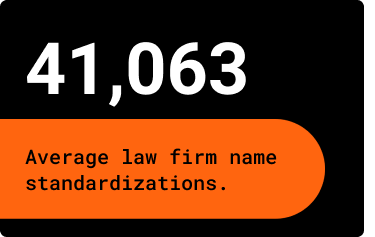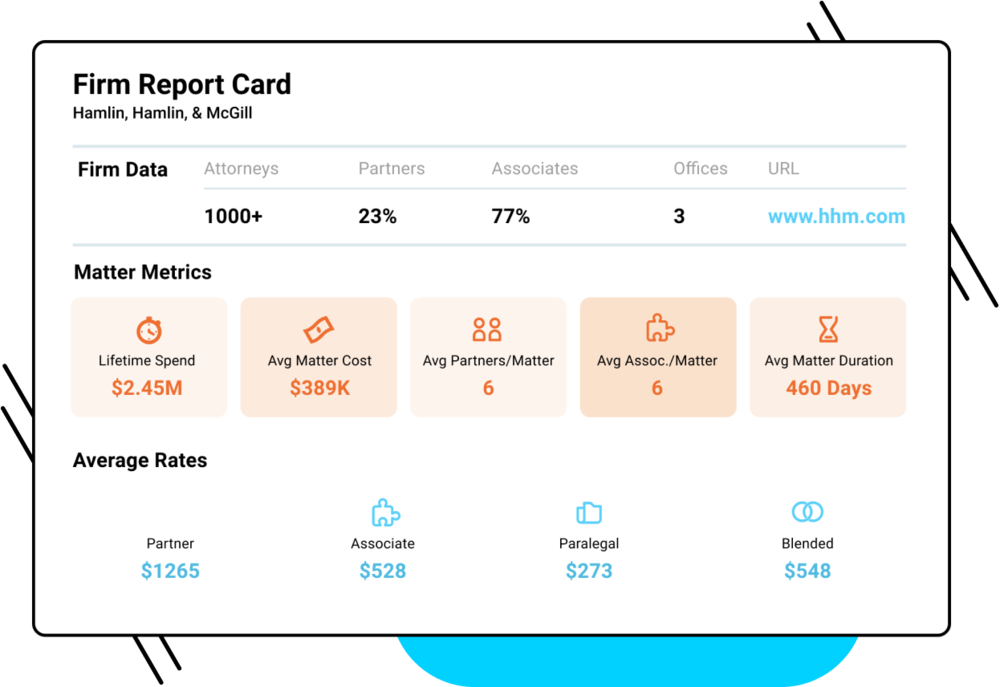With mission-critical legal matters in play, it might seem easier to “deal with it later” when it comes to data or budget management. But with companies expecting their legal departments to do more with less, legal spend management software can deliver the tools and data you need to maximize every dollar and improve collaboration across departments. Actively managing your spend – from firm selection to staffing and invoice review – is no longer a nice-to-have; instead, it’s a necessity for modern corporate legal management.
At Onit, we often see corporate legal departments invest real money into eBillers with the intention of simplifying bill payment and supporting data-driven insights. While eBillers are great for paying invoices, they are not purpose-built for providing sophisticated analytics, let alone surfacing actionable insights.
But what exactly should you expect from your legal spend management solution? Here’s just a few of the challenges the ideal software should immediately resolve:
1. Garbage-In, Garbage-Out
One of the core challenges our users often have when trying to extract insights from their eBillers is data quality. This isn’t usually a problem with the eBiller itself; the problem comes with the data fed to it. Missing or inaccurate data leads to misleading reporting, which can result in inaccurate conclusions and poor decisions. This is sometimes referred to as “the garbage-in, garbage-out” dilemma.
A good legal spend management platform shouldn’t just crunch your numbers – it should clean them first. Cleaning and enhancing your data, and then restructuring it into a healthy data set produces the accurate reporting and meaningful insights you need it to deliver. A foundation of cleansed, structured data is essential. It’s the basis for the value of your analytics, and the decisions about how to best deploy your spend.

Think you don’t have this issue? Think again. Even the most sophisticated legal departments suffer from bad data. Onit processes tens of thousands of data corrections and enhancements every year – per customer.
What to look for: You don’t need a tool to just house your data; you want your data to be processed, cleansed, and enhanced. To do that, it needs AI and machine learning. Without advanced technology, it’s impossible to cleanse data at scale.
2. Uncontrollable Annual Rate Increases
Your law firms might claim that you’re getting the best rates available, but can they prove it?
To get the best, market-appropriate rates, you need market data. That means benchmarking. Benchmarking is a critical part of any good legal spend management system. However, it can’t just be routine benchmarking. The system you select needs to provide smart benchmarks.
So, what is a smart benchmark? Well, you wouldn’t compare the rates for an associate at an insurance litigation firm with the partner rates at a top tier antitrust litigation firm, right? Neither would we.
Make sure the software you select can provide benchmarks that drill down across key attributes like practice area, matter type, and timekeeper level (among others). The software should be smart enough to know which firms play in certain specialties, and to understand that there are tiers within specialties. For example, across specialties, there are “challenger” firms who may have just as much experience, but whose value proposition is to charge less to gain clients from the marquee firm brands. Your system should be smart enough to consider all the above and more when benchmarking.
What to look for: Good legal spend management platforms provide contextually relevant benchmarks, ensuring you compare only similar firms for similar matters. Make sure the software you select not only understands the basics (like timekeeper levels and practice areas) but experience as well. You might be better served going to a smaller regional firm for certain types of matters, and your benchmarks should help you identify those opportunities.
3. Mounting Pressure to Optimize Spend and Allocate Budget Wisely
The business world’s focus on cost-cutting efforts shows no sign of slowing down. As organizations search for more places to optimize, the legal department is in the direct line of fire. But optimizing legal spend isn’t as simple as finding less expensive vendors.
A good legal spend management software will solve this problem. Just like other business verticals, legal can use data to identify optimization opportunities; usually those opportunities take the form of improving work allocation.
Analytics are key here. However, it’s more than just reports. Your legal spend management system should not only provide reports on how work is allocated but insights and recommendations on where allocation can be improved.
For example, you may not need to send every M&A matter to your marquee firm. Or your go-to firm for most matters in a certain practice area may not be allocating tasks appropriately (no one wants a partner doing depo prep, for example).
What to look for: Effective tracking and reporting are a great start, but your legal spend management software should not just provide great analytics about how work is allocated. From firm selection to task allocation, your software should also provide actionable insights on how you can improve that allocation.
4. Inability to Effectively Analyze and Compare Law Firms
What’s the best way to compare your law firms? Until recently, true analysis has been tough. From the lack of hard data to the historical “old boys club” nature of the industry, real analysis has often been placed on the backburner in favor of relationships and market reputation.
Even if you have put together an all-star panel, how do you evaluate your panel firms on performance or rates? How do you know who will provide the most value for the dollar on an upcoming matter while maintaining best-in-class outcomes?
A good legal spend management software is (once again) key. Advanced legal spend management software should not only provide market benchmarking, but also allow you to benchmark your panel firms against each other. Strong reporting is important but purpose-built report cards are better.
Firm report cards should provide visibility not only into the “official” panel firms, but also on any firms you may have used for similar matters. They should include comparisons to the other firms in the panel. For example, on average, how much more or less are a certain firm’s partner rates than the panel’s overall average partner rate? What about average hours billed per matter? Or average matter cost in specific practice areas?
A good firm report card isn’t just useful to you – it’s also useful to your firms. Sending a report card on a regular basis that provides aggregate comparisons to your other firms doing similar work (panel or not) incentivizes better behavior, tighter rate control, and attention to detail.

What to look for: Look for software that makes it easy to not only benchmark the market, but also allows you to compare your current panel of firms. The best legal spend management software will carefully package up those benchmarks into convenient report cards that can be shared with your firms on a regular cadence. This is not only convenient for you, but it’s also a powerful tool for tacit management. Sharing firm report cards on a regular basis will ease potentially tough conversations by giving you a factual basis for your discussion.
So, what’s the takeaway? Everyone, from CFOs to board members, is demanding accountability and transparency on how every dollar is spent. That means actively managing your outside legal spend is more important than ever.
But you can’t manage what you can’t measure. As data plays an increasingly indispensable role in managing your legal spend, best-in-class legal spend management software is no longer a nice-to-have — it’s a must-have.
Most corporate legal departments needed legal spend management software yesterday! Time is money, and the more time you go without leveraging sophisticated legal spend management software, the more money you’ll see drained from your bottom line.
—
Get in touch with our team of legal spend management and data experts to find out how Onit can transform your legal department.






